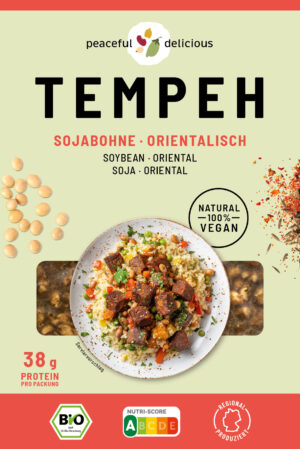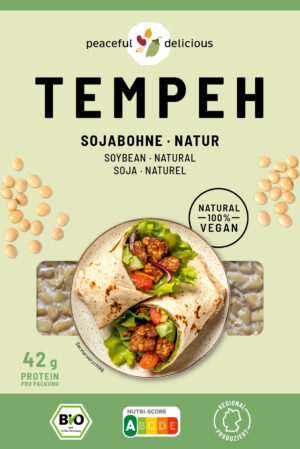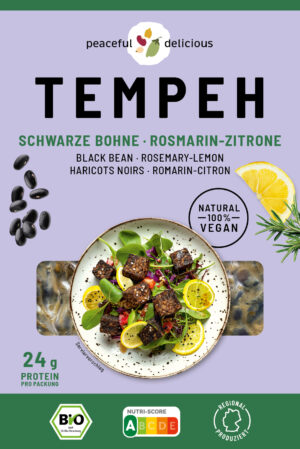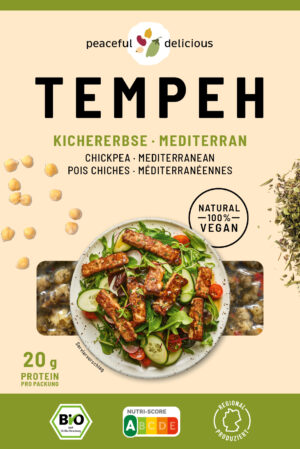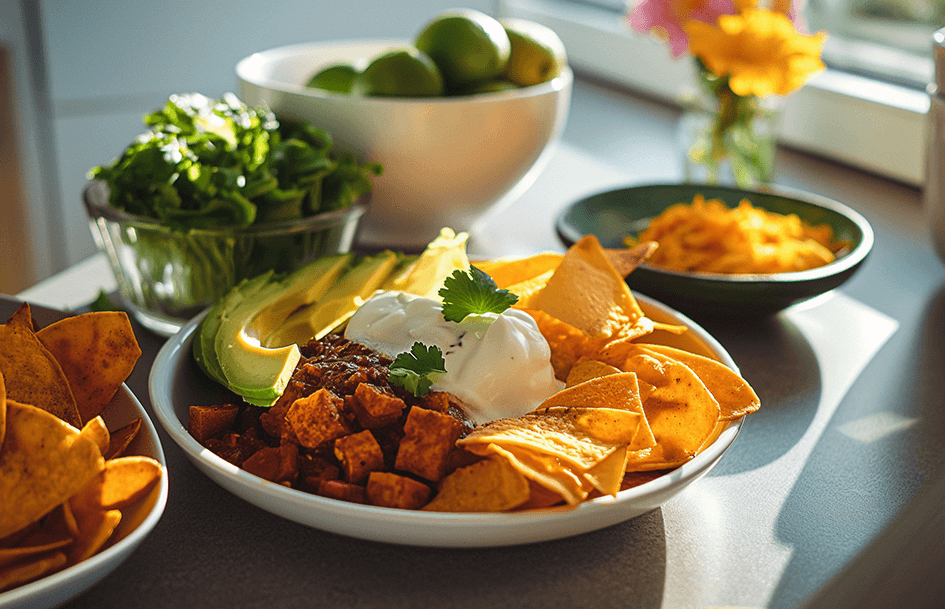Discover the endless
possibilities of tempeh
Tempeh is our healthy protein package! We use traditional fermentation to transform organic pulses into a real superfood. You get 100% natural tempeh from us. Without any frills. Perfect for any kitchen.
Try it out!

ROAST. GRILLING. BAKE. ENJOY.
6 REASONS FOR YOUR
NEW FAVORITE FOOD:

Highest organic quality

Only natural ingredients

Regional production

Purely plant-based

High in protein and nutrients

Fermented
Traditionally fermented
and regionally produced
Tempeh is an ingenious discovery from Indonesia: hundreds of years ago, people observed that a white noble mold develops in fermented soybeans. What initially looked like a failed experiment turned out to be a culinary stroke of luck.
This is because traditional fermentation not only produces unique flavors, but also a particularly healthy, easily digestible and protein-rich food. No wonder tempeh quickly became the Indonesian national dish - and is now produced here in Brandenburg with great conviction.
ALL ABOUT TEMPEH
What does tempeh taste like?
Tempeh has a nutty, slightly earthy/mushroomy basic taste. Depending on the variety and spices/marinade, it can taste mild, spicy or intense. The fermentation gives it a characteristic note that distinguishes it from other (soy) products.
How do I prepare tempeh?
Tempeh can be fried, grilled, steamed or prepared in the oven. You can even put it in your air fryer. Sliced or diced is the best way to prepare it. Our seasoned tempeh is ready for your cooking action. You can pickle/marinate the natural varieties to your own taste or, of course, use them straight away. Tempeh is ideal as a meat substitute/alternative in stir-fries, salads or as a barbecue ingredient. Let our recipes inspire you!
Can I eat tempeh raw?
Yes, you can eat tempeh raw. The pulses are cooked during production and then come into contact with noble molds. As the tempeh is then matured under heat, it is not a classic raw product. Tempeh is also pasteurized before it goes on sale. This means you don't have to worry about possible germs. However, tempeh develops its true taste potential when heated.
What is the difference between tempeh and tofu?
Although tempeh and tofu are both made from soybeans, there are some key differences. Tempeh is made from fermented whole soybeans or other legumes, which gives it a firmer texture and nutty flavor. In contrast, tofu is made from soy milk and has a softer texture and a more neutral taste. Due to the fermentation process, tempeh contains more fiber and vitamins, making it a more nutritious option. Curious to see how tempeh compares to tofu? Test both and find your favorite.
How healthy is tempeh?
Tempeh is very nutritious: rich in protein, fiber, vitamins and minerals. It supports digestion with probiotics and is an excellent source of protein - not only for vegetarians and vegans. Tempeh is also ideal for a gluten-free diet.
Why do you “double pack”?
Many people think: cardboard plus vacuum packaging = unsustainable/environmental sin. But be careful: labels with adhesive are the real environmental sinner/perform much worse here! Our solution:
- Vacuum packaging → Yellow bag
- Cardboard packaging → Paper garbage can
How long does tempeh keep?
Unopened and refrigerated, tempeh will keep for around 6-8 weeks. Once opened, you should consume it within 2-3 days.
Can I freeze tempeh?
Yes, tempeh can be frozen very well. Pack it airtight and it will keep for up to 6 months. For slow and gentle defrosting, simply put it in the fridge. However, the consistency may change slightly.
Is tempeh gluten-free?
All our tempeh varieties are gluten-free. However, please always check the list of ingredients in case they contain spices or additives that are not suitable for your diet.
Where does tempeh come from?
Tempeh originally comes from Indonesia, more precisely from the island of Java. It has been a staple food there for centuries and was traditionally made from soybeans and fermented in banana leaves.


